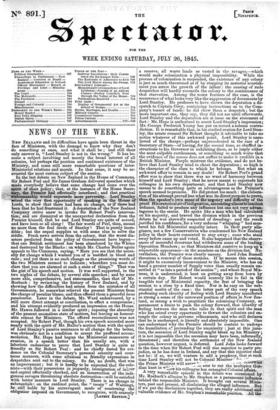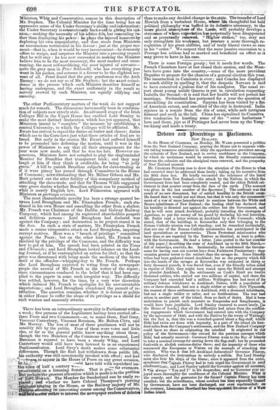NEWS OF THE WEEK.
NEW ZEALAND and its difficulties have again been thrust in the face of Ministers, with the demapd to know why they don't do something at once, and what it shall be ; and still their only answer is, "Lord Stanley is not in the wrong." It has be- come a subject involving not merely the broad interest of all colonies, but perhaps the position and continued existence of the Ministry, and some still more remarkable questions of inter- Ministerial relations and morals. In that sense, it may be ac- counted the most curious subject of the session.
In the last debate on New Zealand in the House of Commons, Sir Robert Peel and Sir James Graham delivered speeches which made everybody believe that some change had come over the spirit of their policy; that, at the instance of the Home Secre- Premier had effectually interfered.; and that practical
manship would supersede mere perversity. Lord Stanley- - seized the very first opportunity of speaking in the House of Lords, to show that there had been no change, or if there had been that he had frustrated it. A deputation of the New Zealand Company strive anew to invoke Sir Robert Peel's interven- tion; and are dismayed at the unexpected declaration from the Premier himself, that he and Lord Stanley are quite of accord, and have been so all along The fair words of Peel, then, meant no more than the foul deeds of Stanley! That is purely- incre- dible; but the sequel supplies us with some clue to solve the riddle. Fresh news arrives from the colony, that the worst dis- asters predicted from the policy of Government have begun— that one British settlement has been abandoned by the Whites and destroyed by the Blacks : on which Mr. Charles Buller again appeals to the Commons, saying, " Here you see that the neces- sity for,change which I warned you of is testified in blood and ruin ; and yet there is no such change as the promising words of the two Ministers seemed to indicate ; wherefore you must de- clare that you are alarmed at such a state of things." That was the gist of his speech and motion. It was well supported, in the two nights of the debate, by several able speeches ; and by none more able, comprehensive, and statesmanhke, than that of Mr. Roebuck : by reviewing the history of New Zealand, and by showing how the difficulties had arisen from the mistakes of all Governments, he somewhat relieved the present Ministers from the charge of peculiar blame, and thus offered them a graceful locus pcenitentiee. Later in the debate, Mr. Ward endeavoured, by a still more direct attempt at conciliation, to effect a compromise ; and his attempt evidently produced an impression on the House. Mr. Hawes followed in a similar spirit ; exposing the absurdity of the present anomalous state of matters, but leaving an honour- able retreat for Ministers. The offered reconcilement was not accepted. Sir Robert Peel, though his own speech accorded more nearly with the spirit of Mr. Buller's motion than with the spirit of Lord Stanley's passive resistance to all change for the better, was obviously not in a condition to accept the proffered accom- modation. Mr. Hope had begun the Ministerial manceuvre of evasion, in a speech better than his usually are, with a laborious endeavour to prove that Lord Stanley is quite as friendly as Sir Robert Peel : and he chiefly rested for evi- dence on the Colonial Secretary's personal amenity and cour- teous manners, with some allusions to friendly expressions in despatches sent out to the colony-. So far, no doubt, that was an improvement ; but it is hardly to be expected that the colo- nists—with their possessions in jeopardy, immigration of iaur and capital effectually checked, and an insurrection of the indi- genous savages threatening absolute destruction—will be satisfied with better manners in Lord Stanley. There is no change in substantials : on the cardinal point, the " treaty " of Waitangi, he .still holds by his extravagant mode of construing the obhgatior imposed on Government, to recognize, with scarcely a reserve, all waste lands as vested in the savages,—which would make colonization a physical impossibility. While the process of colonization is suspended, the existence of any colony is just as much threatened as if by stopping its material nourish- ment you arrest the growth of the infant: the ceasing of rude despatches will hardly reconcile the colony to the continuance of that starvation. Among the worst features of the case, is the recurrence of what looks very like the suppression of documents by Lord Stanley. He professes to have shown the deputation a de- spatch to Captain Grey, containing instructions as to the Com- pany's tenure of lands: he did show them a despatch ; but the more important one, they say-, they did not see until afterwards. Lord Stanley and the deputation are at issue on the statement of fact : Mr. Hope is authorized to assert Lord Stanley's impression;
Mr. George Frederick Young has put on record a solemn contra- diction. It is remarkable that, in his studied oration for Lord Stan-
ley, the astute counsel Sir Robert thought it advisable to take no notice whatever of this awkward point. Lord Stanley is unre- lieved of the charge—perhaps unprecedented in the case of a Secretary of State—of having, for the second time, so shuffled in- structions to his Governor in exhibiting them, as to imply either the most culpable carelessness, or something so much worse that the evidence of the senses does not suffice to make it credible in a British Minister. People mistrust the evidence, and do not be- lieve that Lord Stanley tried to cheat the deputation ; so high is the character of the class to which he belongs. But what an awkward affair to remain in any doubt ! Sir Robert Peel's grand effort was to show that there was no want of harmony between himself and Lord Stanley ; that he never meant to supersede his colleague in his own department; and that Lord Stanley now means to do something quite as advantageous as the Premier's speech seemed to promise. He did protest too much : the elabora- tion of his attempt proved less what was its direct purpose to prove, than the speaker's own sense of the urgency and difficulty of the proof. His oratorical air of indignation, amounting almost to insolent defiance, failed to produce any influence but one not very advan- tageous to the orator. He spoke like a man who had calculated on his majority, and braved the division which in the previous debate he was shrewdly, suspected of dreading : and the result justified his confidence, for a very arduous "whipping" had mus- tered his full Ministerial majority intact. In their party alle- giance, not a few Conservatives who condemned his New Zealand
i
policy n their hearts consented to stay away ; some who staid away before came up and voted. It also happened that the observ- ances of mournful decorums had withdrawn some of the leading Opposition Members ; so that Ministers did contrive to keep up a respectable appearance—in the numbers on the division-list. Ne- vertheless, the Premier was clearly uneasy. Lord John Russell threatens a renewal of these motions. If be means this session, it might be excessively inconvenient to the Minister, who has on hand a greater number of Supply votes than usually remain un- settled at "so late a period of the session" ; and whose Royal Mis- tress, it is understood, is bent on getting away from town by a certain day. Sir Robert would scarcely like to fail in the tangible test of Ministerial capacity, the feat of bringing the session to a close by a fixed time. Nor is he easy on the sub- stantial merits of the case : the latter part of the very speech professing such identity of feeling with Lord Stanley manifested so strong a sense of the untoward position of affairs in New Zea- land, so strong a wish to propitiate the colonizing Company, so paramount a desire to push the colony forward, that identity of feeling between the man who talks in that spirit and the man who has seized every opportunity to thwart the colonists and en- tangle the colony in perverse refinements, and who still declares that he is unchanged, is literally and absolutely impossible. One can understand why the Premier should be content to undergo the humiliation of pretending the unanimity : just at this june. ture, the secession of Lord Stanley might break up his Ministry ; it is not impossible that the secession may have been, informally., threatened ; and therefore the settlement of the New Zealand question, however urgent, is deferred. Lord John looks forward to the time when Sir Robert Peel will rise superior to party pre- judice, as he has done in Ireland, and say that this injustice shall not be : if so we will venture to add a prophecy, that at such
_ , _„. tmzerwitie
time Lord Stanley will not be Colonial Minister . -" the Prime Minister_. will neve:: ;Die to cut the multiplex Gor-
two his colleague has entangled Colonial affairs.
occasioned by
d aAn very o t remarkable enn7a
rkable episode in this debate was
Mr. Roebuck's allusion to Mr. Stephen as a paramount influence behind the responsible Minister. It brought out several Minis-. ters, past and present, all disclaiming the alleged influence. But if we put the disclaimers together, they are really additional and valuable evidence of Mr. Stephen's remarkable position. All the Ministers, Whig and Conservative, concur in this description of Mr. Stephen. The Colonial Minister for the time being has an oppressive sense of the Under Secretary's ability and informatiori: the Under Secretary isastentationaly beckward in giving his opi- nion,—making the necessity of his advice feltit but cancealing ra- ther than displaying his power : he plays the injured innocent by deploring his own unpopularity, and thus steals from Ministers an unconscious testimonial in his favour : just at the proper mo- ment—that is, when it would be very inconvenient—he demurely- offers to resign, and surprises the Minister into a pressing request that he will stay : he has now succeeded in making the Minister believe him to be the most necessary, the most modest and unas- suming, the most self-sacrificing, the most injured of servants— quite the grey man in Peter Sehlemihl, who has everything you want in ins pocket, and esteems it a favour to be the slighted ser- vant of all. Peter found that the grey gentleman was the Arch Enemy : we do not say so of Mr. Stephen but the exact coinci- dence in the process which each Minister describes himself as baying undergone, and the exact uniformity in the result so naively avowed by each Minister, are equally edifying and amusing.



























